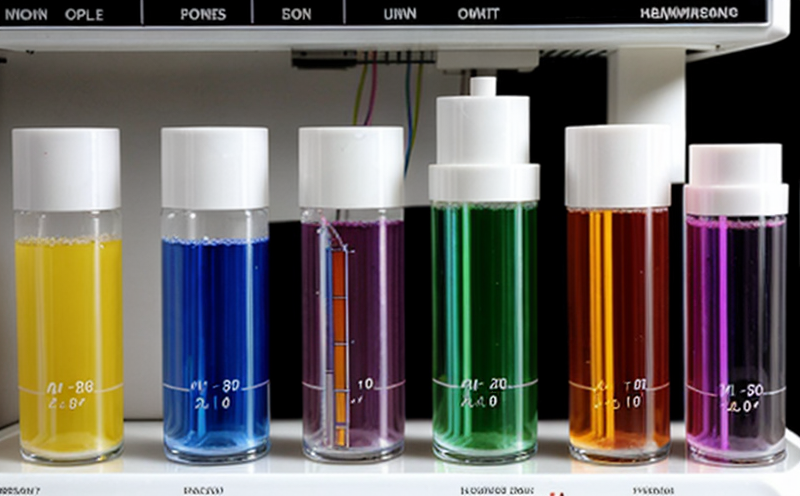JIS K0124 Pesticide Residue Testing in Water by GC
Japanese Industrial Standard (JIS) K0124 specifies a method for determining pesticide residues in water using gas chromatography (GC). This standard is particularly relevant for ensuring compliance with environmental regulations and quality standards in Japan. The testing process involves several critical steps that ensure accurate and reliable results.
The first step in the procedure is the preparation of the sample, which includes filtering to remove suspended solids and adjusting the pH if necessary. Once the sample is prepared, it undergoes derivatization to enhance the detection sensitivity of certain pesticides by converting them into more volatile compounds.
After derivatization, the sample is injected into a gas chromatograph equipped with an appropriate column for pesticide analysis. The temperature program and carrier gas flow rate are carefully selected based on the specific pesticides being targeted. This ensures optimal separation of the components in the mixture, allowing for precise identification and quantification.
The detector used in this process typically consists of a flame ionization detector (FID) or an electron capture detector (ECD), depending on the type of compounds present. These detectors provide accurate quantitative data that can be compared against reference standards to determine the presence and concentration of pesticides.
The results obtained from this method are crucial for assessing water quality, especially in agricultural areas where pesticide use is common. By adhering to JIS K0124, laboratories ensure they meet stringent quality control requirements set by regulatory bodies such as the Ministry of Agriculture, Forestry and Fisheries (MAFF) of Japan.
Compliance with this standard not only ensures environmental protection but also supports sustainable agricultural practices. It helps in reducing potential health risks associated with consuming water contaminated with harmful pesticides. Additionally, it plays a vital role in maintaining public trust by providing transparent and reliable data regarding water safety.
The methodology outlined in JIS K0124 is widely accepted within the scientific community due to its robustness and reproducibility. It has been validated through extensive research and practical application across various sectors including agriculture, environmental monitoring, and public health.
Given the complexity of modern pesticide formulations and their diverse chemical structures, accurate detection methods like those prescribed by JIS K0124 are indispensable tools for ensuring compliance with international standards.
Why It Matters
The importance of accurately detecting pesticide residues in water cannot be overstated. Pesticides play a crucial role in enhancing crop yields and controlling pests, but improper usage can lead to contamination of aquatic ecosystems. This not only harms wildlife but also poses significant risks to human health.
- Ensures compliance with environmental regulations
- Supports sustainable agricultural practices
- Reduces potential health risks associated with contaminated water
- Maintains public trust by providing transparent and reliable data on water safety
Incorporating JIS K0124 into your quality management system demonstrates a commitment to maintaining high standards of environmental responsibility. It helps protect both natural resources and human health, fostering long-term sustainability.
Industry Applications
| Pesticide Type | Sample Source | Application Context |
|---|---|---|
| Organophosphates | Agricultural runoff | Monitoring contamination in surface waters downstream from farms |
| Carbamates | Irrigation water | Evaluating the impact of pesticide use on irrigation systems |
| Pyrethroids | Reservoirs and lakes | Detecting residues in aquatic environments after heavy rain events |
| Nicotine derivatives | Catchment areas | Assessing pesticide migration from agricultural fields to nearby water bodies |
JIS K0124 finds extensive application in various industries, particularly those dealing with agriculture and environmental management. Its ability to detect even trace amounts of pesticides makes it an essential tool for monitoring compliance with regulatory guidelines.
By leveraging this standard, organizations can ensure they are meeting the highest standards of quality control and safety, thereby building a stronger reputation among customers and stakeholders alike.
International Acceptance and Recognition
- JIS K0124 is recognized by international bodies such as ISO for its stringent quality assurance measures.
- The methodology has been adopted by multiple countries with similar environmental concerns, including South Korea and Taiwan.
- It is widely used in academic institutions conducting research on pesticide contamination in water.
- Multinational corporations often require their suppliers to comply with JIS K0124 standards as part of their supply chain management practices.
The global acceptance of JIS K0124 underscores its relevance and reliability. Laboratories that adopt this standard can expand their reach into international markets, enhancing their competitiveness in the global arena.





